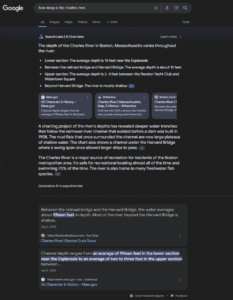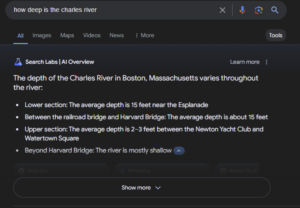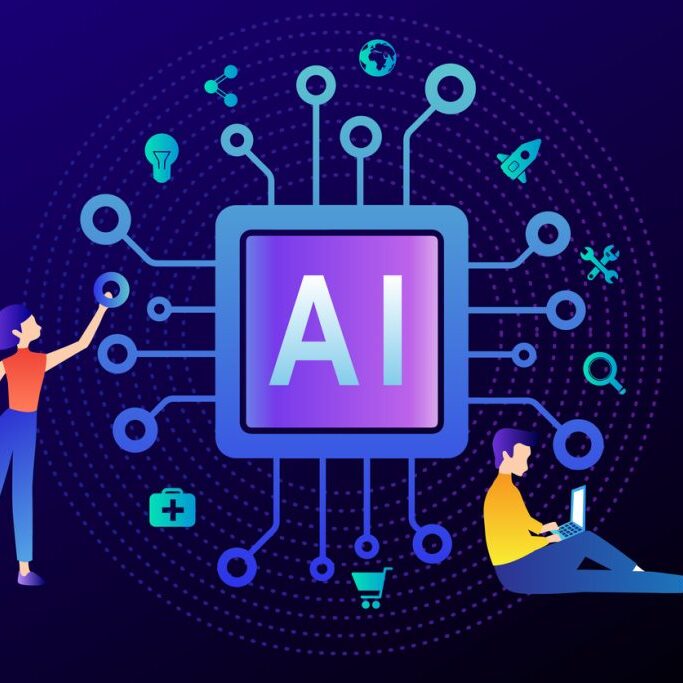Insights < BACK TO ALL INSIGHTS
Will AI lead Google Paid Advertisers to Ask for a Refund?
Will AI lead Google Paid Advertisers to Ask for a Refund?
By: Jake Gray
In May 2024, Google unveiled a suite of new AI products as part of its strategy to reassert its position as a dominant powerhouse in all things technology. This approach includes revamping its Google Search functionality, the product after which it has a verb named, by incorporating its proprietary AI, named Gemini, into Search. Was this a smart move on Google’s part? Or does it just look like it is playing catch-up, risking its reputation for what it does well along the way?
Rather than being an innovation on its flagship product, these additions essentially turn Google Search into a tool with generative AI propped up on top of it. But rather than improving discoverability for businesses that rely on Google or its ad-space for visibility, Google’s AI Overview steers users away from webpages, including those from its paid advertisers.
Such a schema will have profound consequences for the Internet landscape, both in the short-term and the long-term, especially as Google scrambles to prevent further encroachment onto its knowledge-discovery territory by generative AI tools like ChatGPT (OpenAI) and Claude (Anthropic). Below, we get into it.
How AI Overview Works
“AI Overview” has begun replacing “Knowledge Panels” at the top of Google Search, though the latter still appears as well. Here is an example where both are present, with AI Overview on top and Knowledge Panels on bottom, and both giving pretty much the same information:

AI Overview draws heavily from the highest-ranking Google search results and displays a summary at the top of the page, leaving its citations buried in a drop-down menu:

While AI Overview does an excellent job at consolidating seemingly relevant information from the top search results, this tool makes users, especially hasty ones, extremely unlikely to verify the source of the information and much less its reliability. Prior to AI Overview, web-searchers were forced to click on a webpage, analyze and scan its contents, and make a determination from there as to whether the information is sufficient. But as with any generative AI tool, the quality of the output depends on the quality of the model and the quality of the input as well as the probabilities of AI-related issues like hallucinations. In the case of the Charles River’s depth, the answer is pretty straightforward and simple since it is drawn from reputable sources. There are moments where it errs, however.
Here are a few highlights:
- When a user complained that their car blinker wasn’t making a sound, Google’s Overview suggested the user change their blinker fluid, which doesn’t exist and is a joke among car connoisseurs.
- When prompted about detoxes, Overview used unreliable sources to promote unverified claims about detoxes or was missing important context.
- In a search about natural cures for cancer, Overview regurgitated responses from an non-reputable source uncritically.
- AI Overview suggested people should eat at least one rock per day.
- To ensure your cheese sticks to your pizza, AI Overview suggests adding some non-toxic glue as a topping to thicken the sauce.
Understanding the potential for bad publicity, Google quickly patched these issues and rolled back the number of queries that solicits an AI Overview response while improvements are made.
Why AI Overview and Why Now?
The rise of AI chatbots like ChatGPT and Claude pose significant threats to Google’s dominance in the knowledge-discovery market. By offering users a more engaging and interactive experience, providing direct answers to queries, and seamlessly integrating into various platforms, these chatbots are poised to capture a significant portion of Google’s market share. As younger generations gravitate towards the conversational interfaces and versatility of AI chatbots, Google faces the risk of losing its grip on the knowledge-discovery market.
The appeal of AI chatbots is undeniable. In a technological world that thrives on speed and efficiency, they provide the quickest answers to practically every effable query imaginable. No parsing required.
Seeing this, Google fears that AI chatbots will only become increasingly more appealing to users as they increase in sophistication. As such, Google is trying to adapt to the altered needs, preferences, and expectations of its user base—namely, the growing demand for quick-and-easy bites of digestible information. Think of this like McDonalds and the fast food revolution of the 1940s. And now the world’s most beloved sit-down restaurant is trying to join.
Google stands alone among tech giants as a repository of data, which grants the company a significant advantage in developing and refining its AI technologies. Indeed, much of the web, most Internet businesses, and an entire marketing industry (Search Engine Optimization) depends on their websites being discoverable and easily parsed by Google’s algorithms. And AI chatbots are built off of data repositories obtained from the Internet. For Google, it seems like a match made in data heaven for combining AI and its flagship product. But that may not be the case.
The Short-Term
Advertisers may cry foul at the prospect of losing access to the prime real-estate that is the top of Google Search results to AI Overview. With AI Overview taking center stage, users may be less likely to scroll down and engage with the paid ads that have traditionally been a major source of revenue for Google.
This raises the question: will advertisers demand a refund, or at least a price reduction, if or when their return on investment takes a hit due to the AI Overview tool? Google’s paid advertising model has long been based on the premise that the top spots in search results are the primary ones to attract customers. But if users are getting the information they need from an AI-generated summary, they may never see nor care to click through to the advertised web pages. Consider this example, where I have searched for the best hotels near the Grand Canyon:

See that “Sponsored” all the way at the bottom there? Those are paid advertisers who are stuck below AI Overview and Knowledge Panels. If I were really looking for hotels near the Grand Canyon, I’d probably just click one of the links at the top, which are presumably webpages lucky enough to have been discovered by the AI Overview and placed accordingly. In this way, the SEO industry may be replaced or otherwise accompanied by an AI Optimization industry, where companies undergo considerable efforts to be recognized as authoritative not just by a search engine but also by AI. This complicates marketing efforts considerably for Internet-based businesses or those who rely heavily on organic Internet visibility based on carefully crafted expertise and authority.
Even before the introduction of AI Overview, some recent changes to Google Search’s algorithm has sent shockwaves throughout various industries. For example, Catena Media-–a global online lead generation company specializing in iGaming and financial services—cited the changes as “hard-hitting” during an underwhelming first-quarter of 2024 despite improvements in key SEO metrics. In its Q2 update, the company stated that the changes to Search were expected to “reduce revenues and direct costs arising from some of the group’s media partnerships,” although it is seeing higher rankings and more traffic for its brands. Now, with AI Overview looming, even more uncertainty is on the horizon.
This AI endeavor is also a delicate balancing act for Google. On one hand, the company needs to keep pace with the rapid advancements in AI technology and offer users the convenience and speed they’ve come to expect from AI chatbots. On the other hand, Google can’t afford to alienate its advertisers, who have been the backbone of its business model for decades.
Perhaps the company will reimagine its advertising model altogether, as it published last month that it’s looking to integrate advertisements into AI Overview. However, that is a technically complicated endeavor that may present more issues than it solves, as Google would be forced to sacrifice the quality of its AI-generated summaries with information from advertisers and battle other AI inconsistencies simultaneously, such as those mentioned above. Or maybe Google will need to offer advertisers new metrics and guarantees to ensure they’re still getting value for their money, even if their ads are being pushed further down the page.
The potential loss of ad-space revenue is just one piece of the larger puzzle Google faces as it tries to balance the convenience of AI-generated answers with the quality and reliability of the information it provides. If Google prioritizes speed and convenience at the expense of accuracy and credibility, it risks eroding the trust of both users and advertisers in the long run.
The Long-Term
By integrating generative AI tools into its search functionality, Google may unintentionally obscure trusted and authoritative sources, increase the potential for the spread of misinformation, and reduce the traffic directed to websites that have traditionally relied on search engine visibility.
Generative AI tools are on the cusp of sacrificing quality for convenience. And AI Overview only augments that potential. With the increasing proliferation of AI-generated content on the Internet, which itself is used as a knowledge-base to inform the models behind AI, we risk entering a vicious cycle where the quality of information on the Internet gradually deteriorates as AI models increasingly draw from and perpetuate oversimplified, inaccurate, or misleading content—like a game of telephone.
As we’ve seen above, AI-generated summaries may lack the context and nuance provided by the original sources, potentially oversimplifying complex issues or presenting information without important caveats. Had a user been forced to click through to the source, as they would have before Overview or Knowledge Panels, the context may have been readily apparent immediately. Such issues occur because AI models are not search engines but language predictors. They don’t scour the web for the most relevant information but rather generate responses based on patterns in the vast amounts of text data they’ve been trained on. It’s like asking a parrot to give you directions—it might spit out something that sounds correct based on what it’s heard before, but there’s no guarantee it’ll actually get you where you need to go.
This new schema could lead to users having a more superficial understanding of topics and decrease their engagement with the content, a trend already evident in the well-known phenomenon of headline skimming, where users engage with articles based solely on the information gleaned from the headline without reading the article in its entirety. As users become accustomed to receiving quick, AI-generated answers, they may become less inclined to engage deeply with content or seek out diverse perspectives on a topic. In other words, web users may be increasingly impatient to unearth the truth through critical thought, which is, again, a phenomenon already evinced in issues like headline skimming and misinformation issues that have surrounded Facebook. Convenience is great but clarity is better.
Not only will misinformation become more of a pronounced issue, but so will the incapacity for businesses specializing in delivering expert information on a topic to reach their target audiences. If users are getting the information they need from the AI-generated overview, they may be less likely to click through to the source, reducing traffic and potential revenue for these websites. This could have significant implications for the diversity of the online ecosystem and the way businesses operate.
Additionally, this could have the concomitant effect of harming Google’s business in providing Internet-based businesses the ability to generate revenue solely through the use of advertisement-hosting and sharing of affiliate links. If fewer users are clicking through to websites, the value of these ads provided by Google could indeed diminish. But Google may view this effect as already caused by its competitors in OpenAI’s ChatGPT and Anthropic’s Claude. AI Overview is thus a means to hedge perceived oncoming losses.
As such, Google seems to be betting on the AI summaries keeping users engaged with their platform rather than any alternative. This seems most likely, as the company is already looking into ways to insert ads into its Overview responses. Overall, the use of AI in the knowledge-discovery market may come at the cost of harming the sources from which AI models draw their information. Such a contradictory state of affairs may prove unsustainable, as the erosion of trust in the very sources that fuel AI could undermine the reliability and value of the AI themselves.
Conclusion
As we’ve covered in other blog series, the Internet is largely premised upon notions of trust, transparency, and open access to information. AI giants are now in the business of capitalizing on this openness by creating AI models that extrapolate information from the open Internet and compete for users’ attention and engagement with smaller, more-specialized businesses, potentially at the expense of the very principles that have made the Internet a valuable resource for knowledge and discovery.
Only time will tell whether the convenience of AI chatbots will overthrow Google Search as the leader in the knowledge-discovery market or whether the quality and reliability of information will remain the key factors in determining the success of search platforms.





